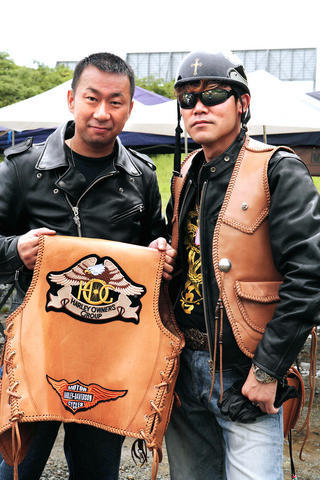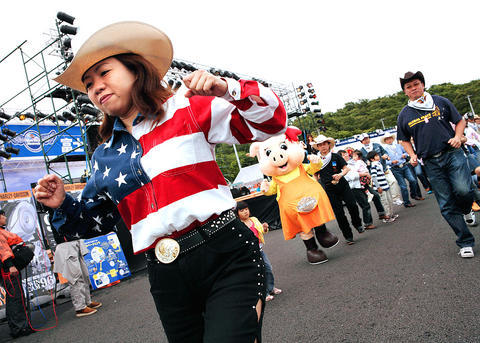By now hardly anyone in South Dakota is surprised when a half-million bikers, a good many on Harley-Davidsons, roar into the Black Hills each August for the Sturgis Motorcycle Rally. Begun in 1938, the event has become a pilgrimage for motorcyclists who trek in for a week of summer revelry, celebrating with like-minded riders, touring natural wonders like the Badlands and admiring national symbols like Mount Rushmore.
By contrast, the spectacle of 20,000 Harley owners gathering in Gotemba, Japan last month for an annual rally at a racetrack in the shadow of Mount Fuji, Japan's tallest peak and most sacred mountain, was jarring. The unmistakable growl of the big Harley V-twin engines was unlike the refined whirr typical of bikes on Japanese roads, and many riders were dressed as if they were pulled straight out of Harley's Japanese Lifestyling Fashion catalog, right down to the US$800 leather jackets and US$85 garage shirts.
At first glance, the extra large Harleys -- quintessential emblems of US brawn and self-reliance -- are an odd fit in Japan, where many roads are narrow and congested and there are already four giant firms -- Honda, Kawasaki, Suzuki and Yamaha -- selling bikes. But the cultural disconnect may be even greater: Japan is also a society that values conformity, not the spontaneity and independence that Harleys represent.

PHOTO: NY TIMES NEWS SERVICE
Yet Harleys are selling better than ever in Japan, despite sticker prices that can far exceed the home grown alternatives. This nation of enthusiastic hobbyists appreciates craftsmanship, styling and the cachet of owning revered foreign brands, whether it's a Gucci handbag, a bottle of 18-year old Glenmorangie Scotch or a machine with a Milwaukee pedigree.
Like many of these imports in Japan, the locals have adopted and adapted Harleys in ways that American purists might find unorthodox -- and perhaps comical. At odds with Harley's muscle-bound reputation were things like the pink dog tags that visitors were given, or the Japanese country band that sang "Sweet Home Alabama" while a crew of Japanese employees of Harley taught line dancing. Then there was the ladies beauty square, a big tent where women were given free manicures, foot massages and time with stylists to revive hairdos flattened by their helmets -- not the sort of services one might expect at a gathering of the Harley faithful like Bike Week in Daytona Beach, Florida.
It was all part of the company's attempt to make the bikes more family friendly, an effort echoed in the US. Not wanting to scare off the curious, the organizers did not include Harley in the name of the event, instead they called it Blue Sky Heaven. Wise to the country's mania for animation, Harley placed cartoon hogs -- a nod to the nickname for its largest models -- around the racetrack for the event.

PHOTO: NY TIMES NEWS SERVICE
"The biggest difference between our bikes and Japanese bikes is we're a lifestyle," said Katsuya Masuda, a sales and promotion manager for Harley-Davidson, which sells in Japan through a network of Harley-only dealers. "We want riders to enjoy our bikes, but also families, too."
The formula seems to be working. The number of new Harleys registered in Japan hit a record 14,026 last year, 48 percent more than in 2000. Sales jumped 13 percent last year when the government scrapped a rule that prevented two people from riding on one motorcycle on the highway.
Harley in Japan attracts older and more affluent riders than usual, no surprise because the bikes and accessories are costly. In Japan's rapidly aging society, older people are spending more time on leisure pursuits, and motorcycle touring fits that trend. The Japanese have also taken to Harley's network of owners' groups that travel together, and swap parts and repair tips.
Japanese Harley enthusiasts interviewed at the festival were aware that the Hell's Angels and movies like Easy Rider have helped define Harleys in the popular American imagination and some were also aware that Harleys once had a reputation for being poorly made. But the bikes are much more reliable now, so the Japanese view them as the classic American driving machines.
"Technically there's no reason Honda, Yamaha or Suzuki can't make a bike as good as Harley," said Christopher Richter, an auto analyst at CLSA Asia-Pacific Markets in Tokyo. "It's all about the brand."
Harley has a burnished image even with Japanese who do not ride motorcycles. Several riders at the festival said that innkeepers and restaurant owners routinely welcomed them when they toured the country.
"These bikes are expensive in Japan, so people think we have families, homes and understand quality," said Jun Toda, 50, a trading company executive from Tokyo.
Toda started riding motorcycles when he was 16, but could not afford his first Harley until a year-and-a-half ago, when he spent US$25,000 on a new white Dyna Low Rider with leather saddlebags.
"In the 1980s, motorcycles were for young people, and now that many of these people are retiring, they are buying Harleys," said Toda, who said his wife and two adult children ride smaller Japanese-made motorcycles.
In a uniquely Japanese touch, he had two trinkets hanging from his handlebars, a policeman to ward off speeding tickets and a white ghost to keep the rain away.
Though thunderstorms kept Toda's wife from attending this year's festival, plenty of other couples did make the trip. Yoshihisa and Midori Uehara, in matching black-and-orange Harley outfits, traveled with their two Boston terriers in denim shoulder bags. Uehara fell in love with Harleys after seeing Arnold Schwarzenegger ride one in the movie Terminator 2: Judgment Day. The Ueharas take their Softail Deluxe bikes on weekend trips along the Pacific coast, staying at inns that allow pets.
"A lot of women ride on their boyfriend's bikes, but we ride our own," she said.
Still, women make up just 7.4 percent of all Harley owners in Japan, versus more than 10 percent in the US. The typical rider is close to 40 and male, Masuda said.
Masaaki Iwashita, 55, bought his first Harley, a blue and white Softail Deluxe with whitewall tires, after he retired from an insurance company two years ago. Like many Japanese retirees, Iwashita wanted to find a community of people who share his passion, so he joined the Harley riders' club near his home in Yamanashi Prefecture.
"A new life, a new bike," he said.

MORE VISITORS: The Tourism Administration said that it is seeing positive prospects in its efforts to expand the tourism market in North America and Europe Taiwan has been ranked as the cheapest place in the world to travel to this year, based on a list recommended by NerdWallet. The San Francisco-based personal finance company said that Taiwan topped the list of 16 nations it chose for budget travelers because US tourists do not need visas and travelers can easily have a good meal for less than US$10. A bus ride in Taipei costs just under US$0.50, while subway rides start at US$0.60, the firm said, adding that public transportation in Taiwan is easy to navigate. The firm also called Taiwan a “food lover’s paradise,” citing inexpensive breakfast stalls

TRADE: A mandatory declaration of origin for manufactured goods bound for the US is to take effect on May 7 to block China from exploiting Taiwan’s trade channels All products manufactured in Taiwan and exported to the US must include a signed declaration of origin starting on May 7, the Bureau of Foreign Trade announced yesterday. US President Donald Trump on April 2 imposed a 32 percent tariff on imports from Taiwan, but one week later announced a 90-day pause on its implementation. However, a universal 10 percent tariff was immediately applied to most imports from around the world. On April 12, the Trump administration further exempted computers, smartphones and semiconductors from the new tariffs. In response, President William Lai’s (賴清德) administration has introduced a series of countermeasures to support affected

CROSS-STRAIT: The vast majority of Taiwanese support maintaining the ‘status quo,’ while concern is rising about Beijing’s influence operations More than eight out of 10 Taiwanese reject Beijing’s “one country, two systems” framework for cross-strait relations, according to a survey released by the Mainland Affairs Council (MAC) on Thursday. The MAC’s latest quarterly survey found that 84.4 percent of respondents opposed Beijing’s “one country, two systems” formula for handling cross-strait relations — a figure consistent with past polling. Over the past three years, opposition to the framework has remained high, ranging from a low of 83.6 percent in April 2023 to a peak of 89.6 percent in April last year. In the most recent poll, 82.5 percent also rejected China’s

PLUGGING HOLES: The amendments would bring the legislation in line with systems found in other countries such as Japan and the US, Legislator Chen Kuan-ting said Democratic Progressive Party (DPP) Legislator Chen Kuan-ting (陳冠廷) has proposed amending national security legislation amid a spate of espionage cases. Potential gaps in security vetting procedures for personnel with access to sensitive information prompted him to propose the amendments, which would introduce changes to Article 14 of the Classified National Security Information Protection Act (國家機密保護法), Chen said yesterday. The proposal, which aims to enhance interagency vetting procedures and reduce the risk of classified information leaks, would establish a comprehensive security clearance system in Taiwan, he said. The amendment would require character and loyalty checks for civil servants and intelligence personnel prior to